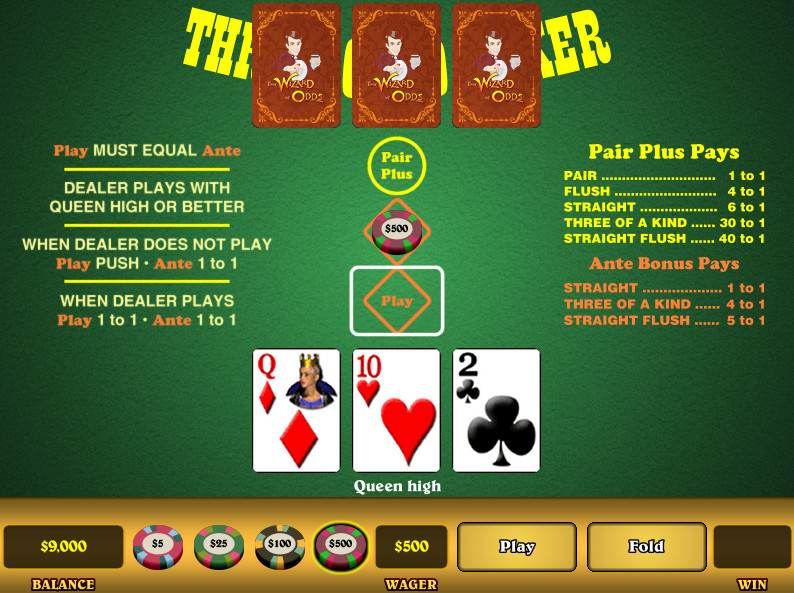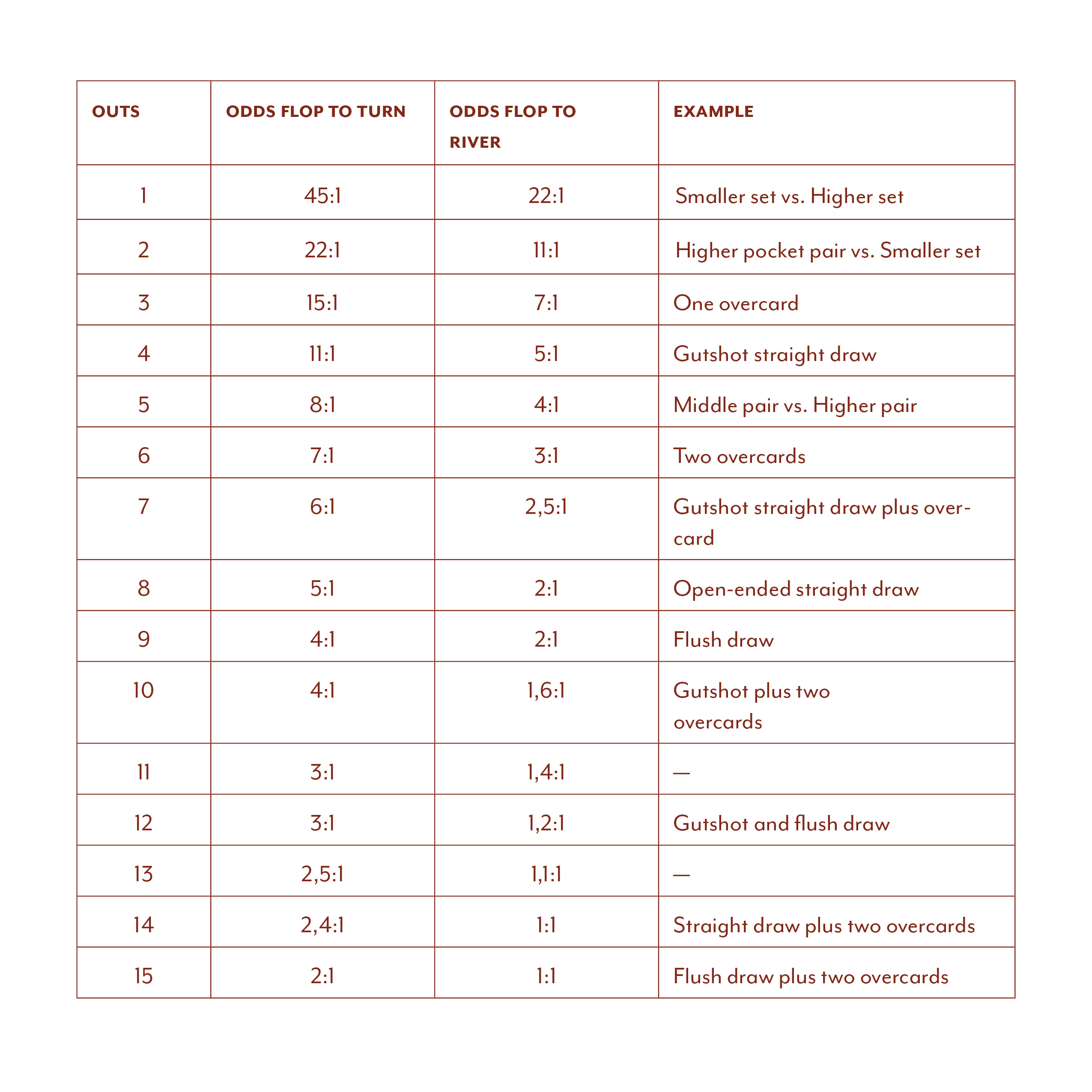Poker Outs Explained

- Poker Outs Explained Game
- Poker Outs Explained Rules
- Poker Outs Explained Games
- Poker Outs Explained Poker
Poker Outs Explained Game
One of the most outdated perceptions of poker is that it is played by shady characters with strange psychic powers, who read opponents’ minds by staring deep into their eyes. These days poker – especially online – relies more on very solid understanding of the mechanics of the game, combined often with a thorough working knowledge of mathematics. It is a far less mysterious business.
Poker Outs Explained Rules
People often say that poker is a game of mathematics and probability. In order to play profitably over the long run, knowing and being able to apply the mathematical skill aspect to your game is certainly true! The strategy involves a part of the game that deals with calculating (1) outs, (2) poker pot odds and (3) your poker equity in a pot. Calculating poker outs is basic maths, the more outs available to you the better the chances you have of winning. Counting your odds is all about assessing which cards are left in the deck and what hands you can make with the remaining cards.
There is no doubt that the very best poker players have actually taken matters even further into the mathematical realm. Some players analyse hands incredibly closely and make numerous in depth mathematical calculations to determine how they will play.
But not everyone needs to approach the game like that, particularly not beginners.
As the many PokerStars School courses progress, some of the mathematical aspects of the game will become more prominent. But at this stage, it is only really necessary to have a general idea of some of the core concepts.
One of the very easy calculations you should learn even at this stage in your poker career concerns counting your “outs”.
Wising up when you enter a poker game means knowing your stuff. That includes everything from knowing the rules of poker games, knowing the forms of poker you prefer to play, and knowing, for example, how to side bet.
In poker, terms are half the battle. From there, you need to orient yourself with the game. Identify the best poker tournament blind structure for you, determine your odds of getting a full house or learn your way around using a Spin & Go poker strategy.
Your options are endless. Below we help you start with the basics, providing you with information and strategy about the most popular forms of poker: Texas Hold’em, Omaha, Seven-Card Stud, 2-7 Triple Draw and Chinese Poker.

These starters will get you going. Soon enough, you won’t have to wonder, “What is poker limping?” because PokerNews will have covered all your bases for you.
Whether you’re playing poker games online or at home, there are some typical strategies you can employ. If you’re playing a home poker game – and you want to continue to do so – one of the most important things you should do is make sure you get invited back! Being a friend in these home game poker scenarios can make you a welcome participant (and maybe a consistent home poker player).
All Poker Games Offline Explained
Texas HoldemMost popular poker game in the world among casual and pro playersHow to Start Playing Texas Hold'em:
- Easy to get started because of simple rules and instant fun.
- The most professional tournaments are Texas Hold'em.
- To improve your skills, you should read strategy articles.
- Get the Poker History Overview.
How to Start Playing Omaha:
- To get started, you need to learn Texas Hold’em rules.
- Easy game to bluff.
- Play two of the most commonly spread variations, Omaha High and Omaha 8-or-better.
How to Start Playing Seven Card Stud:
- The game can be played with two to eight players.
- Seven-card stud does not involve a flop.
- In seven-card stud, it is very important to pay close attention to the cards of your opponents.
How to Start playing 2-7 Triple Draw:
- Hand rankings are the inverse of those in a regular game.
- The worst hand you can hold in this game is a Royal Flush.
- Each player is dealt five cards and there is a round of betting.
Poker Outs Explained Games
Chinese PokerOpen-face Chinese poker is a new and exciting form of poker.How to Start playing Chinese Poker:
- Open-face Chinese poker is a turn-based card game.
- There are no bets placed during the rounds of play.
- Special rule 'Fantasyland' is treated as a bonus round of OFC.
Five Tips to Beat Small-Stakes Online Poker Tournaments
Online, five tips you can employ to beat small-stakes online poker tournaments include being prepared for a long session, being prepared for some crazy swings, keeping it simple by value-betting your hands to the max, listening to the betting (and preparing to lay down some big hands) and forgetting about playing a “balanced style” (don’t worry about revealing your patterns).Start with Texas Hold’em and then begin trying your hand at other games. Learning other poker games can improve your poker knowledge and kick-start your profit. Obviously, we’ve already recommended the highlighted games here: Hold’em, Omaha and Seven-Card Stud. You can add a couple others to the list – razz, Omaha hi-lo and seven-card stud hi-lo – and finish the mixed game acronym: H.O.R.S.E.
Mixed Games Tips
These are the most basic mixed games and can be played online or in person. Omaha hi-lo gives you four cards instead of two, to increase your hand combinations. So think fast about your hands and what your opponents could have. The hi-lo style forces you to think about when a low qualifying board is available and all the possibilities for two-way options. Omaha is the gateway for those who want to take a simple step away from hold’em.If you’re looking for something with a little bit of math involvement, try your luck at razz, a form of stud poker. Probability is essential here and this poker form can help you improve your simple math (with seven cards in a hand, two down and one up).
Seven-card stud, the next in the lineup, involves simple math with an extra kick because straights and suits are added into the mix. Both razz and seven-card stud can help with your hand-reading ability and memory.
The seven-card stud hi-lo is for the masters of the seven-card stud with the added difficulty of high-low because you have to figure out which players have low eligible boards and which don’t. In either Omaha or seven-card stud high-low, you’re looking for two-way hands that can help you scoop pots.

Live Poker Rules and Procedures
 If you do decide that you want to try your luck in a casino, you still have a chance to win your first poker game with some help from the dealers. Generally, dealers are happy to help with rules and procedures of the game (just not with playing your hand).
If you do decide that you want to try your luck in a casino, you still have a chance to win your first poker game with some help from the dealers. Generally, dealers are happy to help with rules and procedures of the game (just not with playing your hand).Just be sure to keep your cards on the table where the dealer can see them, cover your cards so your opponents can’t see them, stay quiet when the current hand is being played (even though people violate this rule all the time), say “raise” before you throw in your oversized chip, wait your turn and place your large denomination chips at the front.
Beyond that, most rooms will give you a quick free lesson so you can get the rundown/mechanics of the game. Dealers will correct you if you violate a rule, but don’t take it too seriously! This is a game and should be fun, but we all have to play by the rules. Don’t worry about justifying your play; just make sure you tip the dealer if you win a pot.
Best case, by working your way through these poker variations in any setting (online, live or from your home), you can become the expert and refer your friend to the resources that helped you win some of the best tournaments around the world. Just make sure to throw us a nod, comment or tweet when you brag about your winnings!